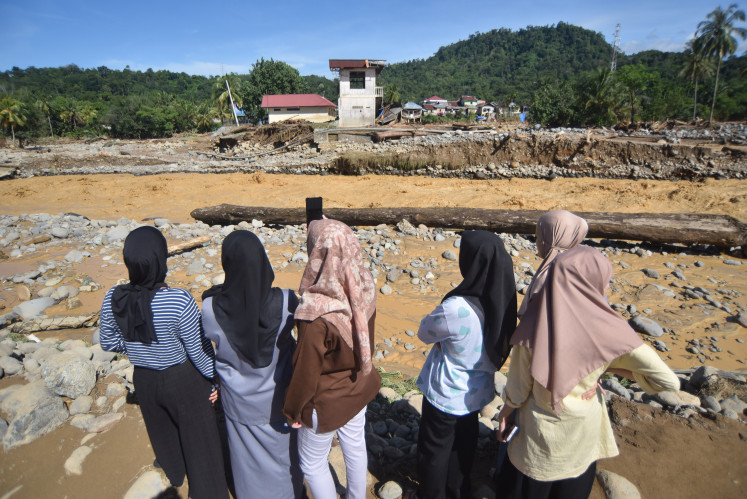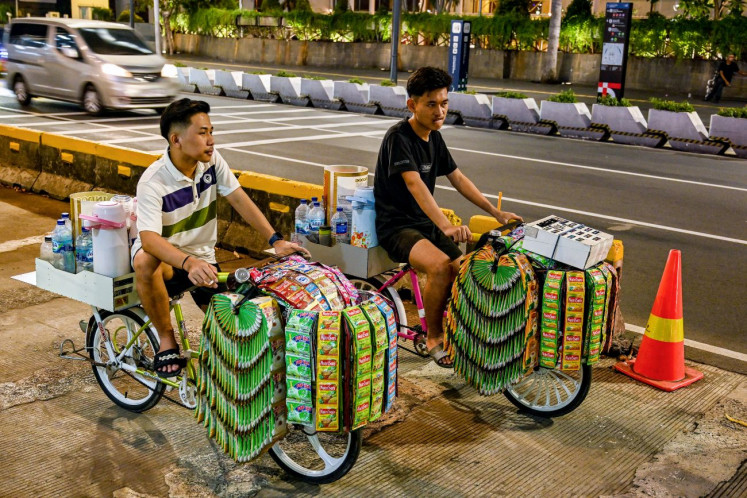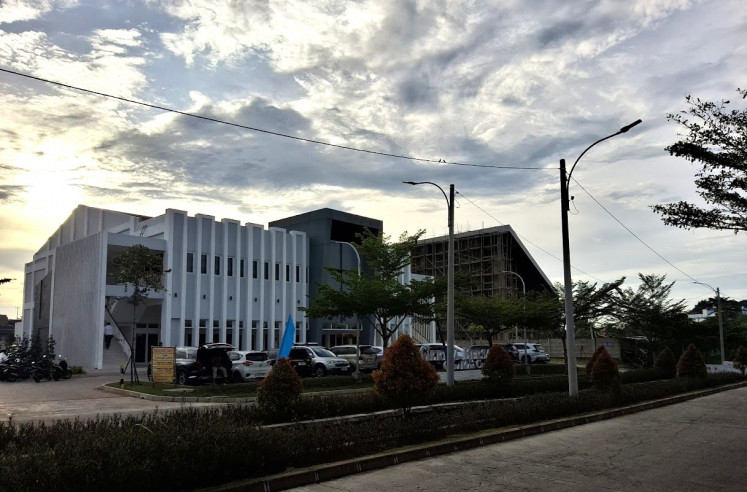Popular Reads
Top Results
Can't find what you're looking for?
View all search resultsPopular Reads
Top Results
Can't find what you're looking for?
View all search resultsCOVID-19 in Asia: Politics of epidemics
Critics were concerned about two major factors that might have led to Indonesia’s record of no positive cases in the past two months, the first being competence and the second one being transparency.
Change text size
Gift Premium Articles
to Anyone
O
n Monday, President Joko “Jokowi” Widodo announced the first two confirmed cases of the novel coronavirus in the country, breaking Indonesia’s record of zero reported cases. In a way, this is reassuring as it disproves the implausible notion that Indonesia, as the world’s fourth-most-populous country, is “immune” to the virus.
Critics were concerned about two major factors that might have led to Indonesia’s record of no positive cases in the past two months, the first being competence and the second one being transparency.
Some initially suspected that Indonesia was incapable of detecting the virus. Indeed, the scarcity and high price of viral testing kits may have been a consideration in deciding how many and which cases were tested. Moreover, reports have shown that simply checking for fever and respiratory symptoms may not be completely effective, as people carrying the virus may not immediately show symptoms, or not fall ill at all, while still being able to infect others.
Now that the first two cases have been announced, the government is taking active measures to cure the infected patients and prevent further transmission by tracking down those who were in contact with Indonesia’s patient zero. This helps to alleviate both domestic and international concern over Indonesia’s competence and determination in fighting the outbreak.
The issue of transparency is of utmost importance when it comes to mitigating an epidemic. Governments may be incentivized to keep the number of “reported cases” as low as possible to avoid panic or having other countries issue travel warnings and travel bans on them. However, this would be detrimental: citizens in need may not be receiving adequate diagnosis and treatment; the disease is more likely to spread within and beyond the country; and finally, this would result in the international community’s lack of confidence in the country.
The contrast between South Korea's and Japan’s response to the outbreak serves as a good example. Korea has been actively testing potential cases of the virus and maintaining transparency, with over 121,000 cases being tested. This has come at the cost of Korea’s international image. Inevitably, testing a high number of cases means that more positive cases would be reported - the total number of infections in Korea now exceeds 4,800. As a result, at least 13 countries have imposed travel bans or travel restrictions on South Koreans. The fact that cases go undetected and/or unreported does not mean that they do not exist. It is even more dangerous to have undetected patients spreading the virus.
In contrast with Korea, Japan’s response to the outbreak has been criticized as being passive, inflexible and opaque. An op-ed article in the New York Times criticized the Shinzo Abe administration’s policy in face of the looming pandemic. The Diamond Princess cruise ship incident has been a public relations disaster - some Japanese nationals on board were allowed to go free without quarantine or tests. “And so the Japanese people have been told not to seek testing, nor bother visiting medical institutions unless their symptoms are severe and lasting.”
Understandably, this may have something to do with Japan’s culture of denial and silence - if no one brings up the problem, then it could be treated as nonexistent. Some speculate that it may also be related to fears that the upcoming summer Olympics, scheduled to be held in Tokyo, could be affected.
It should be clear that refusing to detect cases or not disclosing the relevant figures could only harm a country’s image in the long run. It may look good on the table to have a lower number of confirmed cases - but if this phenomenon is the result of incompetence or a deliberate attempt to conceal, confidence in the government’s capability and even integrity would be lost.
Thus politics may come into play in how a government fights the outbreak. In fact, some have been worried about Southeast Asia’s response to the epidemic given its close relations with China.
A TIME article pointed out inadequacies in the measures taken by Southeast Asian governments. “At the beginning of the outbreak, several of these governments downplayed the severity of the threat, publicly voicing their wariness of offending the superpower upon whom their economies rely.” Cambodia, in particular, shares the closest ties with China among Southeast Asian countries. Prime Minister Hun Sen has refused to issue travel bans or evacuate citizens stranded in Wuhan, and even flew into China himself in February.
Fears are that politics may have even corrupted the world’s highest authority in health issues. The World Health Organization is under fire for its position in the current crisis.
Director-General Tedros Adhanom Ghebreyesus has repeatedly praised China for its response to the virus outbreak, saying that China is “setting a new standard for outbreak control”. This contrasts with the WHO’s criticism of other countries regarding the epidemic. The WHO belatedly declared the disease a global health emergency.
Tedros’ stance on China goes against international criticism of its authorities, who arrested eight whistleblowers in Wuhan for “rumor-mongering”. WHO emergency committee member John Mackenzie called China’s responses “reprehensible”, suggesting that “there was a period of very poor reporting, or very poor communication”. This has led to criticisms of WHO’s professionalism and credibility.
Governments should not let politics interfere with their work in disease prevention. The world should also show more appreciation to countries and authorities that are dedicating efforts and resources into the testing of potential cases, even at the cost of their image.
At the Munich Security Conference Tedros proclaimed, “The greatest enemy we face is not the virus itself; it’s the stigma that turns us against each other. We must stop stigma and hate.” In fact, there is another factor bigger than stigma. In face of the global pandemic, transparency and integrity in governance is the antidote for this stigma and hate; the lack of these would only exacerbate the current crisis.
As for Indonesia, it is official that the virus is now within the country. The government must maintain a high level of transparency to ensure public confidence. Science, not politics, should be the utmost guiding principle in this battle. We shall show to the world that Indonesia is not a threat but a trustworthy partner in fighting what looks like a looming pandemic.
***
The writer is a junior research assistant on Southeast Asian politics at the University of Hong Kong.










